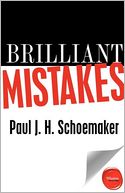 Brilliant Mistakes: Finding Success On the Far Side of Failure
Brilliant Mistakes: Finding Success On the Far Side of Failure
Paul J.F. Schoemaker
Wharton Digital Press (2012)
How and why mistakes “enlarge our range of experience, shrink our ego, and thereby increase the chance of discovery.”
The title of this review was excerpted from a longer passage worthy of inclusion now. Paul Schoemaker observes, “The great virtue of mistakes, whether they occur accidentally or by design, is their ability to enlarge our range of experience, shrink our ego, and thereby increase the chance of discovery. If you accept that humans are myopic and largely unaware of their own bounded rationality, then some degree of mistake-making is appropriate and welcome. This is especially hard in organizations but leaders can start by instituting awards like the Golden Egg.” That is, view mistakes as (potentially) valuable assets, not as “failures.”
Schoemaker notes that one CEO obtained some empty L’eggs pantyhose plastic eggs, sprayed them with gold paint, and used them when awarding the “best mistake of the month.” That is, the mistake from which the most valuable information was obtained. As Thomas Edison never missed an opportunity to point out, understanding what doesn’t work is critically important to determining what does.
Several passages caught my eye. For example, “Four Factors Impacting a Decision’s Outcome,” each of which has the potentiality to “blind us about the quality of a decision, to lead us away from the path of truly understanding another person’s judgment toward quick but potentially false and unfair conclusions.” (Pages 14-22) Another, “Conditions That Favor Deliberate Mistakes,” offers invaluable advice when mistakes should be encouraged because long-term learning is more important than short-term results. “Consider the strategy of deliberate mistakes as one of many tools that managers can employ when operating on the right side of the knowledge spectrum.” (Pages 88-92). Still another, in Chapter 7, traces “the pathway of a brilliant mistake” that led a Scottish scientist, Alexander Fleming, to the eventual discovery of penicillin. (Pages 120-126).
When concluding his brilliant book, Schoemaker asserts, “The key question companies need to address is not `Should we make mistakes?’ but rather `Which mistakes should we make in order to test our deeply held assumptions?'” Obviously, he does not recommend making mistakes, per se. Rather, to think boldly and commit to initiatives that — if they fail or fall short of expectations — provide information that will be most valuable to achieving eventual success.